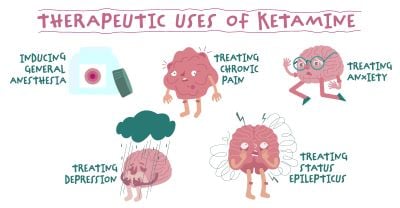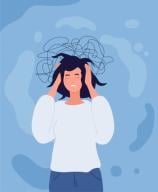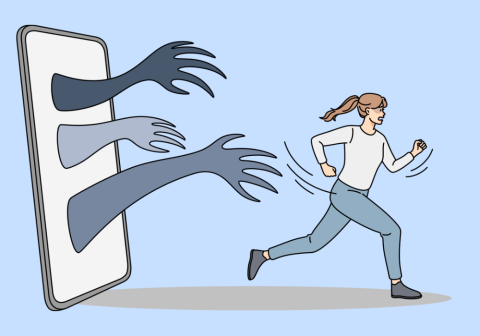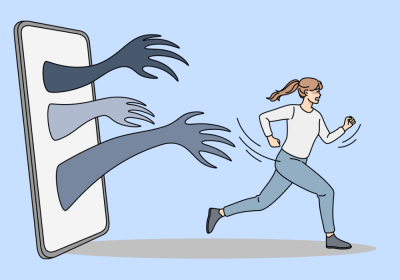Ketamine: A Rising Star in Mental Health Treatment
Ketamine: A Rising Star in Mental Health Treatment

Ketamine is not a new phenomenon, though it seems to be in the news a lot these days as if it had been recently discovered. As a medication used traditionally as an anesthetic, ketamine now shines as a potential lifeline for those battling severe depression, anxiety, and suicidality. As an anesthesiologist, I provide all types of anesthesia from simple to complex cases but I am particularly focused on using the best evidence-based medicine to provide interventional mental health services. Through the practice I founded in Houston, Texas, Wells Medicine, my colleagues and I provide treatments such as ketamine infusions, stellate ganglion blocks, and nitrous oxide treatments for mood disorders.
Ketamine: Then and Now
Ketamine was developed in the early 1960s and was known for a long time as an anesthetic used in veterinary medicine. While it has a reputation for being strong and dangerous, which it can be if not used clinically, ketamine is a globally known and widely used drug which is safe and effective in a controlled and professional medical environment. It has been administered countless times in rigorous circumstances and in the sickest and most fragile of patients.
New research and evolving clinical usage is keeping this old drug in the headlines of research publications and newspapers across the world. About 8 percent of American adults report a major depressive episode while 18 percent of American adults suffer anxiety symptoms, and suicide was the eleventh leading cause of death in 2021.
With rising rates of depression and anxiety, we are seeing a pattern that doesn’t seem to be slowing and as an ADAA member and medical mental health professional, I am very concerned. Like any drug, medication therapy or treatment, ketamine has its side effects and disadvantages, but we have to look at the benefits and the evidence-based scientific information that shows ketamine’s use is safe, effective and often results in immediate improvement.
Ketamine and Depression
Ketamine continues to be an excellent treatment option for major depression, with over 70 percent of patients seeing a significant reduction in negative symptoms with three infusions. In fact, the results from a single ketamine infusion can show benefit within an hour and last up to 14 days. The infusions are recommended as part of a series tailored to a patient’s needs. Outside of clinical research studies, some form of therapy is often added to help build resilience and coping strategies throughout the ketamine infusion series. Ketamine’s broad receptor interactions and good safety profile make it a promising alternative for patients unresponsive to standard treatments.
Ketamine and Anxiety
New studies show that ketamine is effective in treating refractory (treatment-resistant) anxiety, even in a population that has both refractory anxiety and treatment-resistant depression, which is generally thought of as a more difficult population to treat due to more severe symptoms and higher probability of relapse.
Treatment-resistant anxiety causes damage in the neuronal connections of the hippocampus and the prefrontal cortex. Part of the downstream effects of ketamine binding to its various receptor partners is to increase neural plasticity and growth which may help reverse some of the changes in the hippocampus and in the prefrontal cortex. In other words, if ongoing treatment-resistant anxiety is not addressed, it can do more damage in the long term.
Ketamine’s Impact on Suicidality
Recent studies have demonstrated ketamine’s capacity to rapidly reduce symptoms of suicidality. Notably, 78 percent of patients experiencing suicidal thoughts showed gradual or rapid improvement following intravenous (IV) ketamine treatment, positioning it as a critical component in the toolkit for managing suicidality.
Future Research and Promise
The link between biological markers and the response to ketamine treatment is an area ripe for exploration. Future studies are encouraged to investigate how endophenotypes, genotypes, response patterns, and specific biomarkers could inform treatment plans, particularly concerning suicide prevention, timing for relapse prevention, and maintenance schedules to sustain anti-suicidal effects.
Ketamine has been a breakthrough treatment for anxiety, depression, and suicidality. Its ability to provide rapid and effective relief in treatment-resistant cases offers hope to those struggling with severe mental health challenges. As research evolves, ketamine continues to stand as an indispensable tool in our mental health treatment arsenal. I look forward to ketamine continuing to receive serious consideration by healthcare providers, patients, and families exploring treatment options. It has the potential to shine a light for so many in the dark.
For copies of posters presented at the ADAA 2024 annual conference in Boston, click here.




















